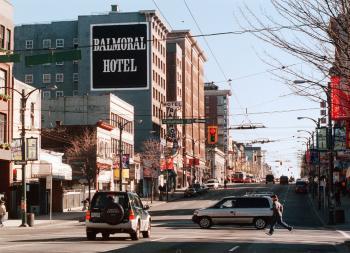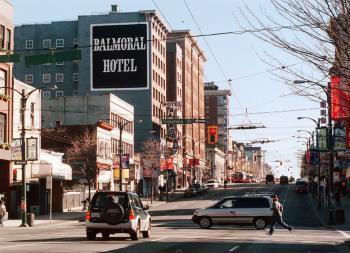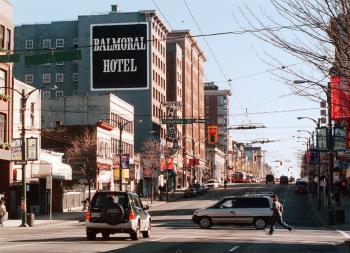Despite outgoing mayor Sam Sullivan’s Project Civil City, which aimed to cut homelessness by at least 50 per cent by 2010, homelessness has stubbornly continued to rise.
“Nobody’s building rental accommodation and as a consequence people are being squeezed out and then moving down and moving other people out of low income rental accommodation and eventually somebody ends up on the street,” says Councillor David Cadman.
A member of the Coalition of Progressive Electors (COPE), Cadman and Vision Vancouver mayoral candidate Gregor Robertson released a joint Homelessness Strategy last Thursday at Crab Park in the Downtown Eastside, one of Canada’s most poverty-stricken and problematic areas.
COPE, Vision Vancouver and the Green Party are running on a shared slate, all endorsing Robertson for mayor. The three civic parties hope this coalition will prevent a split in the vote and help them oust the ruling Non Partisan Association (NPA).
Robertson’s main rival is Peter Ladner, who in June narrowly won nomination as the NPA’s mayoral candidate, beating Sullivan by 80 votes.
Cadman says homelessness increased by 22 per cent in the three years of Sullivan’s term as mayor. He criticized the NPA for reversing a policy stipulating that the South East False Creek housing project would be one-third low income. It is now “20 per cent for low income and 80 per cent for the wealthy.”
“They say they’re concerned but when it comes to a vote they vote against social housing, and when it comes to a plan that was accepted by the community in terms of South East False Creek, they’ve reversed that.”
COPE’s 10-point homelessness plan includes using 200 empty units at Little Mountain for social housing and protecting existing low-income housing by enforcing current bylaws.
The strategy would also require an equivalent number of affordable social housing built for every unit of market housing built in the Downtown Eastside and adjacent neighbourhoods, freeze conversion of rental accommodation to strata title condos, and require developers to incorporate 20 per cent affordable housing in new developments.
The NPA plans to build 3,813 units of “non-market and supportive” housing by 2010, 758 of which are already completed.
In its platform, the NPA said it will look at the possibility of making city-owned land available for rental housing units and relax regulations for secondary suites in existing single-family homes, among other initiatives.
COPE candidate Ellen Woodsworth is hoping the election will result in a more democratically run council, something she says has been lacking. The current council consists of an NPA mayor and five councillors, as opposed to just one COPE councillor (Cadman) and four Vision councillors.
“What has been happening for the last three years under NPA is that they discuss what they want among themselves and then they bring it to the council meetings. They have a majority, so it gets passed. So you don’t have a real discussion of all the council members about what needs to be done.”
She also wonders whether things will change much if Ladner gets elected, saying he “has voted with Sam Sullivan on every major issue for six years,” an observation Councillor Raymond Louie has made as well.
Calls seeking comment from Ladner and NPA Councillor Kim Capri were not returned by deadline. Sullivan spokesperson David Hurford said Sullivan would not comment, as interviews regarding the election are to be left up to Ladner.
When Ladner announced his challenge for the NPA nomination, he said in a prepared statement that he wants to end the “petty bickering that has characterized city hall.” In an interview with The Tyee, he said if elected he would run the mayor’s office in a more ”open and transparent” fashion than Sullivan.
Cadman says the current council has made many decisions he doesn’t support, including spending $25 million on a 311 phone system when there are far more pressing issues that could use such funding.
He also says going to court over the Falun Gong protest site outside the Chinese consulate on Granville Street is a waste of taxpayer’s money, as he believes the case will most likely end up in the Supreme Court of Canada.
The city ordered the protest removed in 2006, saying it violates a bylaw. A hearing starts at the BC Supreme Court on November 3.
“If you’re going to take on bylaws then for goodness sake enforce maintenance bylaws — we have roofs on downtown buildings that are leaking…. If you’re going to enforce bylaws, enforce bylaws that protect citizens. Don’t enforce bylaws that harass people who are making a religious, political, social protest. That’s not the priority spending of our legal dollars.”
Whoever gets elected on November 15, the new mayor will inherit “a legacy of taxes” as a result of taxes going up 21 per cent during NPA’s term, says Woodsworth.
“We haven’t lived within our means. They’ve spent, but they’ve put the onus on paying on the next term in office. We’re in a crisis now with the taxes going up so much — we’re in a terrible situation.”







